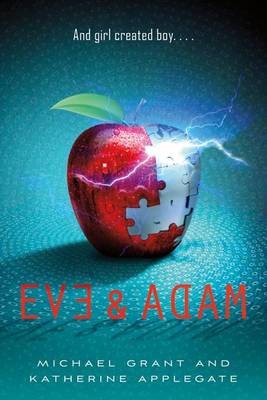Reviewed by Briana @ Pages Unbound on
Notes on the Audio Book: The audio book features two narrators, with Jenna Lamia narrating Eve’s POV and Holter Graham narrating Solo’s. Overall, I found both talented and enjoyed listening to them read. Each gave distinct voices to other characters’ dialogue. Lamia read nearly all of Eve’s part in a wondering voice, which was occasionally out of place (I would imagine lines like “My drawing still sucked” to be either deadpan or annoyed, not wondering), but overall the effect was a good one. In fact, listening to Lamia probably made this book more enjoyable than it would have been if I had read it myself, as Eve has a tendency to state the obvious, but Lamia made it sound as if she were actually observing something new and interesting. Lamia also gave Eve’s friend a shallow, annoying voice, which was also sometimes out of place (Does she really have to sneer innocuous lines like “Hello”?) but in most cases the voice fit the girl’s character. Graham generally reads Solo as if he is more macho than he is, which also sounds appropriate to Solo’s personality. You can listen to a sample here.
The story: Eve and Adam is billed as a sci-fi book about the building of the perfect boy. This has the potential to open all kinds of cans of worms: exploring what it means to be human, what it means to play God, how far science can really go, etc. Readers expecting such heavy-handed themes will be disappointed. Eve and Adam is really sci-fi light. Creating Adam is almost a side plot; the real story focuses on Eve’s relationships, with her mother, her best friend, and the mysterious new boy Solo. The main action plot is about Spiker Industries in general, hinting that the company may be engaging in illegal activities.
The problem is: The plot hints that the company may be breaking some laws. The authors more than hint that Eve’s mother, CEO of the company, is evil incarnate because of this. Now, readers would be right to be appalled by a corporation, and a woman, apparently okay with ignoring federal regulations and engaging in sketchy human testing practices (never specified what testing rules are skipped), but, in the end, Tara Spiker just lacks ethics. She never comes across as scary. (Although all the characters would tell you she is. Total villain in heels. Very scary. But this is telling the reader—it is never adequately shown. Even the “damning” photographic evidence Solo finds does not seem as horrific as he and Eve make it out to be.)
And, after all this, the ending takes away from much of the “evilness” the authors spend the entirety of the novel building up. Things tie up a little too neatly to be satisfactory.
The other plots, the ones involving Eve’s relationships, are somewhat more interesting than the science/mystery plot, but they also tend to the one-dimensional. Eve’s friend Aislin is a walking disaster—sex-obsessed, vulgar, a drunkard, and attached to a loser drug dealer boyfriend. Much of Eve’s and Aislin’s time is spend dealing with said boyfriends' problems with gangs. Although one wants to admire Eve for attempting to save Aislin from her own self-destructive behavior, one also wonders what the two possibly have in common and what Eve sees in her. Her mother kind of has a point: Eve has terrible taste in friends. Eve’s romance plot fares a little better, as Solo is probably more likeable to the general public (He is smart, resourceful, and not a drunken drug dealer. Score!) However, Eve and Solo do not really build a relationship. Somehow, several chapters in, they acquire one. And…then they are in one. Although it is difficult to pinpoint what exactly is wrong with them, they probably will not be winning major awards for being a “swoon-worthy couple.” They just lack chemistry.
On the style level, Eve and Adam is unique. The descriptions and analogies tend to the unusual—in fact, tend to be the type of strange descriptions one associates with amateur creative writers trying very, very hard to sound profound or artistic. When a nurse strips Eve to take a look at her injured leg and exclaims, “Oh my God!” at the sight, Eve reports to the reader, “She has laid my flesh bare, and her first thought is to call up a deity?” Later in the novel, Solo’s thoughts include the phrase, “as your brain spins inside its bone cradle.” A “bone cradle” sounds like a kenning the Anglo-Saxons could be proud of, but it is a little out of place in modern writing. Obviously, this style can take getting used to, but most readers should become accustomed to within a few chapters, at which point it may even be possible to start appreciating it. I, at least, am all in favor of kennings making a comeback.
Eve and Adam is entertaining, and it has a lot of great elements: dramatic run-ins with gangs, a crazy-cool super-lab compound, a romance, a computer program that allows anyone to build the perfect human. However, it often lacks. The characters and their relationships are a little flat, the science is not that hardcore, the major plotline does not seem as urgent or horrifying as the authors and characters want readers to believe. The book might be worth taking a few hours to read, but I do not recommend it as one of my top reads.
Content Note: Moderately heavy profanity. References to sex.
Reading updates
- Started reading
- 30 July, 2013: Finished reading
- 30 July, 2013: Reviewed
